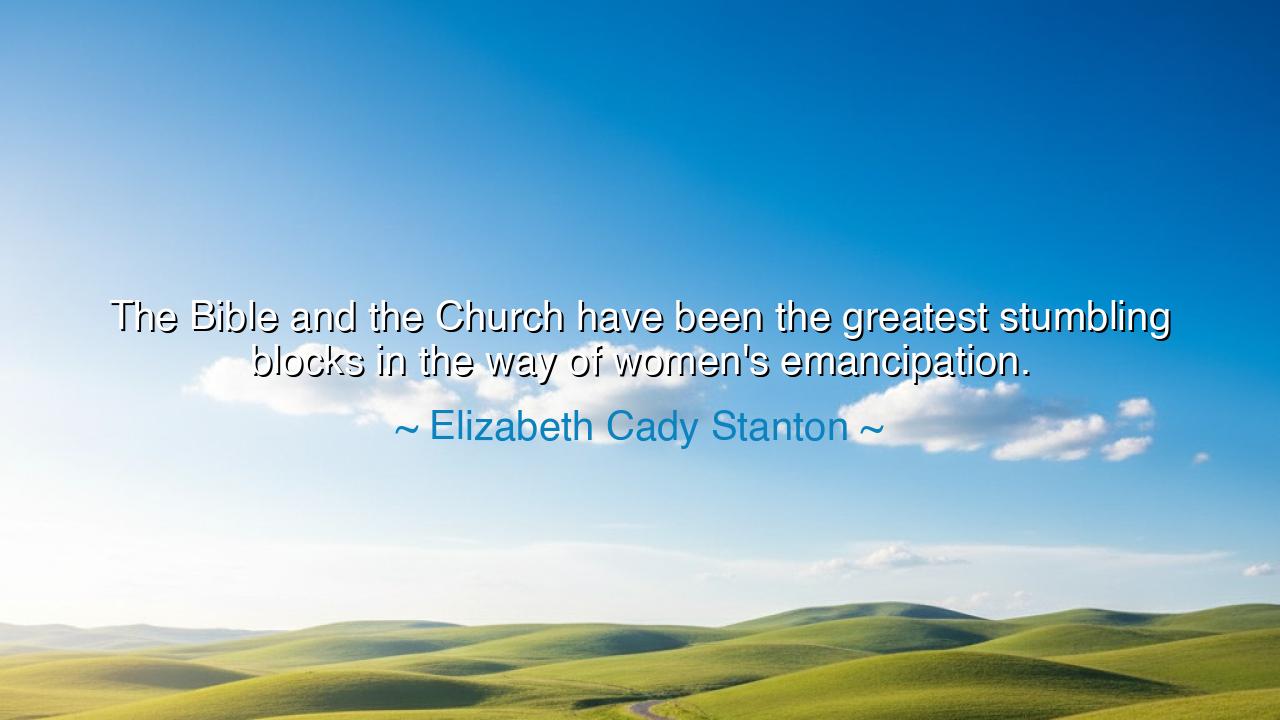
The Bible and the Church have been the greatest stumbling blocks
The Bible and the Church have been the greatest stumbling blocks in the way of women's emancipation.






Elizabeth Cady Stanton, the mother of women’s emancipation in America, spoke with the voice of fire when she declared: “The Bible and the Church have been the greatest stumbling blocks in the way of women’s emancipation.” These were not words born of rebellion for rebellion’s sake, but of deep anguish and unshakable truth. She saw with clear eyes that the chains of women were not only forged by law or custom, but sanctified by scripture and enshrined by the altar. Hers was the cry of a prophetess who dared to name the sacred as the source of oppression.
The Bible, wielded not as a book of wisdom but as a weapon, was long used to silence women, to bind them in submission, to declare them lesser in the sight of heaven. And the Church, as guardian of tradition, stood often as a fortress against change, defending ancient hierarchies with holy words twisted into shackles. Stanton did not despise faith, but she despised the use of faith to chain the daughters of Eve. To her, these institutions had become stumbling stones upon the path toward freedom, obstacles that turned women’s steps into stumbling, their voices into whispers, their lives into shadows.
Consider the story of Hypatia of Alexandria, the brilliant philosopher and mathematician of the 5th century. She taught wisdom to scholars, counseled leaders, and embodied the power of a woman’s mind unbound. Yet she was condemned by zealous bishops, accused of sorcery, and torn apart by a mob in the name of the Church. Her death was not merely the silencing of one woman, but a warning across centuries: that when the union of faith and power fears the rising of women, it answers not with reason but with violence. Stanton knew this history, and she sought to ensure such silence would not be eternal.
And yet, from these stumbling blocks came resistance, and from resistance came strength. Stanton, alongside Susan B. Anthony and other brave souls, rose like pillars against the weight of centuries. They defied pulpits that told them to be silent, they rewrote scripture in the “Woman’s Bible,” and they proclaimed that the voice of God could not be the voice of oppression. What was once stumbling became the ground of battle, and in that struggle women learned to stand taller than before.
O descendants of freedom, let Stanton’s words be a torch in your hands. Remember that even the holiest of institutions may be corrupted by the thirst to control. Remember that emancipation is not given by priests or kings but won by those who dare to demand it. And know this: the stumbling blocks placed before the feet of the oppressed can, with courage, be turned into the very stones upon which new temples of equality are built. For truth is not the enemy of faith, but of chains.






QDTruong Quy Dung
It’s hard to ignore the history of gender roles perpetuated by religious doctrine. How can we shift the focus of faith to empower women rather than restrict them? Would it be possible to reinterpret religious traditions in a way that uplifts women, while still maintaining their core values? How do we balance respect for religious institutions with the demand for gender equality?
HNhung nguyen
In light of this perspective, should we challenge the traditional role of religion in shaping societal norms? Could a more inclusive interpretation of religious texts help break down barriers for women? But then again, how much of this is a reflection of cultural bias within religious teachings, and how much of it is rooted in the texts themselves?
THNguyen Thai Hoa
Is it possible that religious institutions, while providing comfort and guidance to many, have also contributed to the oppression of women? How much influence does religion still have in the struggle for women's rights? It’s an interesting debate whether the very foundations of faith need to be reconsidered to ensure women are seen as equals within these systems.
TPtuan phong
How can we reconcile the historical teachings of religion with the evolving role of women in society? If institutions like the Church have played a role in suppressing women, can they also evolve to empower them today? It’s worth asking whether the Bible’s interpretation has been misused or misunderstood, and if so, how can it be reinterpreted to be more inclusive and supportive of gender equality?